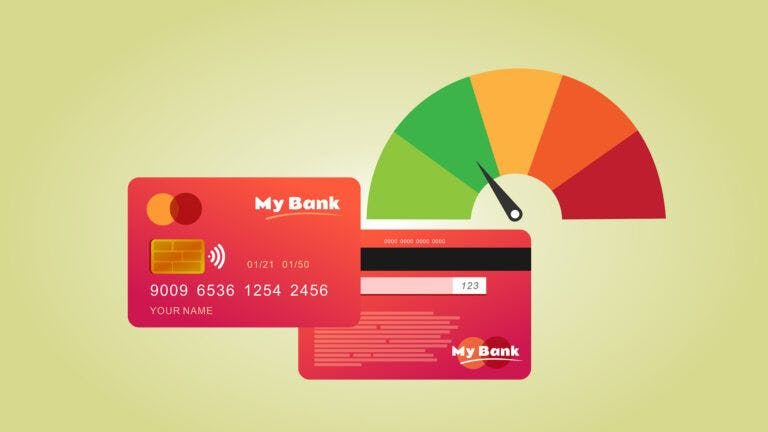
Everything you need to know about credit scores

For something that’s so important and has such an effect on your life, credit scores are tricky things to understand. We often get lots of questions – from what is a credit score? to why have I got a bad credit score? – so we thought we’d put together a post that answers lots of the most common questions about credit ratings, all together in one handy place.
What is a credit score?
Well, in the simplest of terms, a credit score is a method that lenders use to estimate how likely it is that you’ll be able to repay any money you borrow. Using a range of information – from your repayment history to how often you’ve moved house – they’ll give you a score that represents how safe a prospect you are for borrowing money. The higher the score, the lower the perceived risk of lending to you, which means you can borrow more money at favourable rates.
A bad credit score on the other hand means that it’s more difficult to find a lender who is happy to lend to you. However, there are companies out there that specialise in loans for people with a weaker credit score.
Remember that lenders don't just use your credit score when deciding whether to lend to you or not - they look at a range of information, including the details on your application form, and take into account any past dealings they have had with you. Also, lenders are looking for different things - a credit score that's fine for one lender or one particular product might not be accepted for a different lender or a different product.
What is a good credit score out of 700? And what is a poor credit score?
This is a really good question and seems like it should have a really simple answer, but it’s actually a little bit complicated. In the UK, there are three credit reference agencies – the companies that give you a credit score – and they all use different methods and scores to decide your rating. Handy, eh? So, while Equifax gives your credit a score out of 700, Experian – the main UK credit reference agency – give you a score out of 999. And then, to make matters even more complicated, TransUnion, the third agency, give you a score out of 710.
Confused? We don’t blame you.
Here’s how those numbers break down:
- Equifax:
Fair: 380 - 419
Good: 420 - 465
Excellent: 466 - 700 - Experian:
Fair: 721 - 880
Good: 881 - 960
Excellent: 961 - 999 - TransUnion
Fair: 566 - 603
Good: 604 - 627
Excellent: 628 - 710
So, if you check your credit score online – make sure you see what reference agency is being used to see what band you fit into.
How can I check my credit score for free?
Checking your credit score online is surprisingly easy. All you have to do is sign up to one of the free credit check sites and enter a few details, and you’ll see your credit score. That said, the free services only show you the score from one credit reference agency, which means that you have to sign up to three services to get a picture of the overall credit score; Experian, Clear Score and Credit Karma.
Why? Even though 77% of lenders use Experian to check your credit score, about 50% also use Equifax and 33% also use TransUnion. This means that – although it’s likely lenders will use Experian – it pays to make sure your credit scores across all three are tickety-boo.
Does checking my score impact my credit rating?
Nope, not at all. In fact, only hard inquiries like applying for a loan or credit card affect your credit score – everything else is known as a soft search and doesn’t affect it at all.
How to improve my credit score immediately?
Unfortunately, there’s no quick fix to improve your credit score – but that doesn’t mean there aren’t small things you can do to improve your score pretty quickly.
These three quick-and-easy tips could all make a big difference to your credit score over the course of a month or two:
1. Set up direct debits to make regular payments
If you can, pay for regular outings using direct debit. Whether it’s a phone bill, gas or electric bill or you’re your rent, paying by direct debit is a great way to show that you can responsibly manage your money and make regular payments on time.
Top Tip: If you always pay your direct debit on time and that avoid missed payments, you should notice your credit score start to improve. Missed payments can really hurt your chances of being accepted for credit.
2. Make sure you’re on the electoral register
This is probably the quickest tip on the list – it only takes about 5 minutes to do. Why does it help? Because it shows the credit agencies that you exist and that you live where you say you do.
3. Get an authorised overdraft facility
If you think you may need to borrow but don't have an authorised overdraft facility, think about heading into your local bank branch or go online to see if you can set one up. Authorised overdrafts can help to show that you are someone who can borrow money responsibly – and they also give you a safety net to prevent other missed payments, as the payments can be paid out of your agreed overdraft if you’re a little short on cash on payment day. This sounds like robbing Peter to pay Paul, but paying for something using your authorised overdraft is a much better option than missing a payment in terms of protecting your credit score. Do remember to keep within your overdraft limits though and don't borrow on overdraft if you don't need to. An overdraft is debt and you need to keep an eye on it.
What causes a bad credit score?
Lots of things – from missed payments to not being registered to live at your address – can damage your credit score. In fact, this question is far too complicated to answer in a quick Q&A. There are a few things on there that might surprise you in terms of how they impact your credit score. For example, having no or little credit history can weaken your credit score just because the credit reference agencies don't have much to go on. If you only ever pay off the minimum on your credit card, that can have a negative impact too.
Does income affect my credit score?
Your credit report doesn’t include anything about income, so how much you earn doesn’t directly affect your credit score. However, in a roundabout way, it does. A higher salary (theoretically) means that you can (again, theoretically) manage your finances a little easier as there’s more money to go around – which can mean that you protect your credit score from the damage of missed payments.
If you’d like more in-depth answers to any of these questions – or just want to get a little more clued up on everything to do with credit scores – you can check out the credit rating section of our blog. If you have any questions you’d like us to tackle, drop us an email!
Author
The Bamboo Team
Posted
26 July 2021